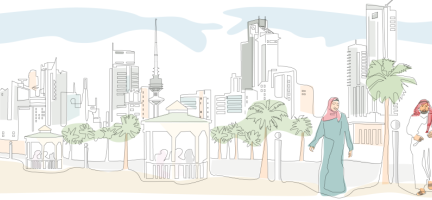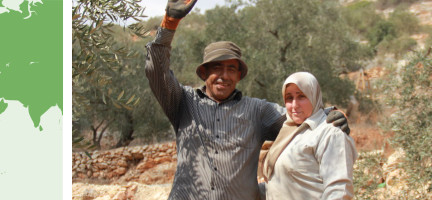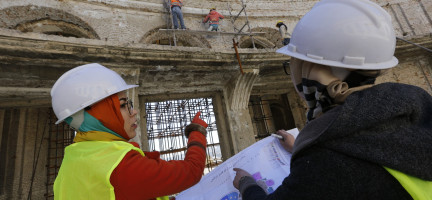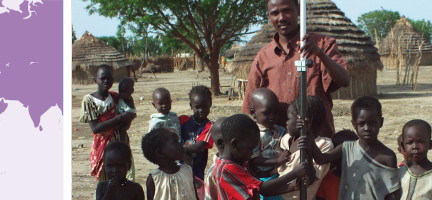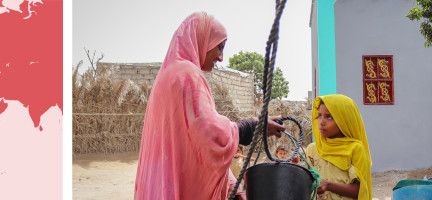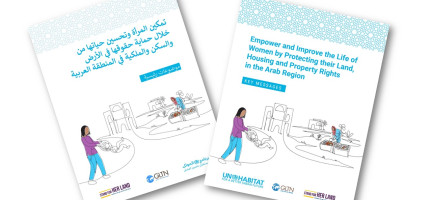Koweit
Page en construction.
Partagez avec l’Initiative Arabe sur le Foncier les documents, publications et autres informations qui peuvent être présentés ici. Écrivez à unhabitat-arablandinitiative@un.org
Legal and institutional framework
The legal system in Kuwait is a blend of Sharia law and civil law. Sharia law plays a significant role particularly in matters related to family law, inheritance and personal status. Civil law governs commercial, property and contractual issues in Kuwait.
Kuwait’s land and property rights are defined and protected by the Constitution, where private land ownership is safeguarded. Article 18 of the Constitution stipulates that no person shall suffer expropriation, except for public benefit [1].
Some of the key laws related to land tenure and property in Kuwait include:
Law No. 25 of 1971 on the rental property, places, and regulates the relationship between landlords and tenants.
Decree-Law No. 35 of 1978 specifically concerns rental properties.
Law No. 50 of 1994 regulating land-use space is also a reference point in solving land-related disputes.
Kuwait is primarily an urbanized country administered by the central government, with various ministries, such as those responsible for health, education, housing, and social welfare, playing specific roles in urban development. The Kuwait Municipality is a central authority dedicated to the planning and development of urban areas, and it serves as a key organization that can lead efforts to improve urban legislation [12].
Kuwait has been making efforts to align the seven pillars of Kuwait Vision 2035 with the United Nations' Sustainable Development Goals. In 2014, Kuwait introduced a new environmental protection legislation, Law No. 42, which was amended by Law No. 99 in 2015. This law marks an important milestone in the country’s pursuit of its Vision 2035. It designates specific grazing areas based on established criteria and requires responsible parties to review and update the boundaries of these areas every decade. The law bans grazing on natural islands and protected reserves and it provides safeguards for endangered species by prohibiting their trade in accordance with the Convention on International Trade in Endangered Species of Wild Fauna and Flora and other international standards [2].
In 2023 the Government of Kuwait unveiled its Fourth Master Plan, which outlines the country's urban policies for land use until 2040. Building on a long-standing planning tradition that began several decades ago, the Master Plan aims to create a balanced approach to urban development, ensuring the accommodation of anticipated population growth both within the city and in surrounding areas. Its focus is on Kuwait’s policies on urban, economic, social and environmental development, keeping pace with future population growth [3].
Land tenure
Kuwait has made substantial progress in improving its land administration systems to be more efficient in terms of procedures, time and cost necessary to register a property. It now takes an average of 17 days and a seven-step procedure to register property. Both the property inspection and registration processes have been streamlined. Official service standards on property transfer have also been published, improving the quality of land administration services in Kuwait [4].
Kuwait law recognizes both freehold and leasehold land tenure types. While freehold ownership is restricted for those who are not from Gulf Cooperation Council (GCC) countries, leasehold is available as an alternative [5].
Kuwait has implemented a detailed set of regulations governing real estate ownership by non-citizens, with specific rules based on the individual's nationality. These measures aim to balance the country's interests while maintaining both economic and legal stability within the real estate market. Citizens from GCC countries, including Saudi Arabia, the UAE, Bahrain, Qatar and Oman, enjoy the same property ownership rights as Kuwaiti nationals. They can buy real estate in Kuwait without facing additional restrictions, reflecting the strong economic and political ties among GCC states [6].
For Arab nationals outside the GCC who wish to own property in Kuwait, several conditions apply. There must be a reciprocal agreement between Kuwait and the individual’s home country on property ownership rights. The individual must also secure approval from the Kuwaiti Council of Ministers, and the property must be situated in a residential area designated for private housing. Additional requirements include a minimum of ten years of residence in Kuwait, a clean legal and criminal record and demonstration of financial capacity to own the property. These owners are also limited to one property in Kuwait, with the property size restricted to a maximum of 1,000 square meters [6].
If a non-GCC Arab inherits property in Kuwait, they must sell it within one year unless granted exceptional permission to retain it. This policy ensures that property ownership is aligned with the country's regulatory framework and prevents non-citizens from holding real estate in the long term without special approval. Additionally, if a person loses their Kuwaiti citizenship, any housing applications they have submitted will be canceled, as they no longer meet the eligibility requirements for housing. According to regulations from the Public Authority for Housing Welfare (PAHW), a housing application can only be processed if the head of the family holds Kuwaiti nationality. Individuals whose citizenship is revoked no longer meet this condition, and their applications will be invalidated [6].
Land value
Land in Kuwait is expensive and its cost is determined by a combination of factors, including nearby infrastructure developments, location, limited availability and high demand, particularly in urban areas near Kuwait City. Most land outside of urban centers is owned by the Kuwait Oil Company, which has led to inflated prices in areas that are available for development. In central locations, such as downtown Kuwait City, the costs of both commercial and residential land are especially inflated [7].
The real estate market in Kuwait benefits from high oil prices, available capital, and investor confidence, which has driven up land prices. However, cultural factors, such as a preference for low-density housing, and a market saturation in certain areas, have created challenges. Despite high vacancy rates in some parts of the city, landlords are hesitant to reduce prices, further inflating rental and land costs. Many Kuwaiti developers are increasingly seeking investment opportunities outside the country, in markets like Dubai and Qatar, where returns are higher [7].
Despite being one of the wealthiest countries globally, many Kuwaitis struggle to afford homes in their own country due to the cost of land, which accounts for around 80 per cent of the total value of a house, about 30 per cent higher than the global average. While the government allocates 400 square meters of land to young families to build homes, the waiting time for these plots can average 15 years, and they are often located far from the city center, making them inconvenient for access to essential services, businesses and leisure activities and contributing to unsustainable low density urban sprawl [8].
The private sector also faces challenges in acquiring land for development, leading to a shortage of commercial, residential and industrial properties. This artificially created scarcity drives land prices even higher, making it increasingly difficult for most Kuwaiti families and investors to afford real estate. The combination of limited land availability and the high cost of land creates an unsustainable market, where demand far exceeds supply, further exacerbating the affordability crisis [8].
There are no property taxes or transfer taxes in Kuwait. However, Article 1 of Law No. 2 of 2008 on the implementation of tax rules stipulates that profits resulting from the lease of any properties in Kuwait are subject to annual income tax.
Land use
Approximately 75 per cent of land in Kuwait is primarily designated for grazing and recreational activities, including spring camping and hunting. Oil fields cover about 7 per cent of the land, which includes areas developed for wells and related infrastructure. Water reservoir zones represent the surface extent of aquifers and natural water sources. Military zones account for 4 per cent of the country’s land area, dispersed across various regions. Other notable land uses include Kuwait City's built-up areas (3.5 per cent), agricultural land (3 per cent), and areas for quarries, borrow pits, construction debris disposal, communication infrastructure, cemeteries, parks, encampments, power plants, racetracks and vacant land, which together make up 7 per cent of the total land area [9].
Article 107 of Kuwait’s environmental protection law, Law No. 42 (amended by Law No. 99), stipulates that the competent authorities determine the grazing load in the wild areas based on the capabilities of the pastures, as well as stipulating that the competent authorities update the grazing sites every ten years as a maximum. Article 101 of the law protects endangered species and prohibits their trade, stipulating a penalty amounting to 50,000 Kuwaiti dinars, according to Article 151 [10].
Land development
The Government of Kuwait has made tremendous efforts to comply with the needs of Kuwaiti citizens since the 1950s. The Public Authority for Housing Welfare is responsible for providing housing and social services, as well as distributing or renting homes at affordable prices. Since its establishment in 1956, it has allocated around 163,667 housing units, including 9,696 units and 564 apartments available for rent to eligible Kuwaiti families [11].
The Public Authority for Housing Welfare (PAHW) offers land plots to Kuwaiti citizens at prices much lower than the market value. The government charges a fraction of the actual market value for plots of land, which varies depending on the land’s proximity to urban centers like Kuwait City, as well as its suitability for development. This subsidy reflects the government's commitment to helping citizens secure land for housing, although it also contributes to the inflated land prices in the private market. While the subsidized prices are accessible for citizens, the difference between government-set prices and market rates highlights the discrepancy in land value in different parts of the country.
Kuwait’s housing plans, particularly those under the PAHW, are comprehensive and include the development of both physical and social infrastructure. When new housing projects are undertaken, they typically involve the creation of essential services such as roads, electricity, sewage systems, water supply, and communication networks to ensure the functionality of the urban areas. Additionally, the development includes social infrastructure such as schools, healthcare facilities, police stations, places of worship, sports complexes, government offices, parks and retail spaces like supermarkets, all aimed at enhancing the quality of life for residents.
The PAHW is currently overseeing a major program aimed at addressing Kuwait’s housing shortage through the development of large-scale urban and suburban cities. These new cities, which are being planned and developed across the country, are expected to vary in size, typically ranging from 30 to 140 square kilometers.
A core element of this strategy is fostering long-term partnerships with the private sector for the successful delivery of housing projects, aiming to benefit both the public and all involved stakeholders. The new cities being developed will be designed using the most modern and sustainable urban planning practices, customized to suit Kuwait's climate and cultural context. Key design considerations include the following [13]:
Overcoming the limitations of existing urban spaces by introducing high-quality infrastructure, such as artificial lakes, to enhance the amenity value of the new towns, as well as creating three-dimensional landscapes that offer enriching urban experiences. A well-developed mass transportation system will also be a central feature.
Ensuring social sustainability by offering a variety of housing options that cater to diverse groups and social classes. The cities will also be environmentally sustainable, incorporating the latest energy-efficient technologies for power generation and consumption. Economically, these cities will be designed to foster job creation, with the goal of achieving long-term self-sufficiency.
The development will feature a range of urban functions to serve the diverse needs of residents, including education, business, entertainment and recreation. This holistic approach will create a dynamic and vibrant urban environment, while positioning the cities as regional hubs.
Cutting-edge smart city technologies will be integrated to enhance citizens’ quality of life and optimize city operations. These technologies will be carefully adapted to Kuwaiti culture and traditions.
Enduring partnerships with the private sector, which will help alleviate the financial burden on the government and provide developers with opportunities to invest in residential real estate. This collaboration is essential for the sustainable development of these new urban areas.
Land dispute resolution
Land disputes in Kuwait arise from issues such as property ownership, inheritance, zoning, development rights and conflicting land use. Kuwait's land dispute resolution system primarily involves both legal and administrative mechanisms, relying on courts, governmental bodies and sometimes mediation to resolve conflicts.
Land disputes in Kuwait are primarily resolved through the court system. The Courts of First Instance handle civil, commercial, personal status and penal matters. These courts often deal with property-related disputes, including real estate transactions, ownership disputes and evictions.
While the formal court system is the primary venue for land dispute resolution in Kuwait, mediation and arbitration are increasingly used as alternative methods for resolving property-related conflicts, especially in commercial and real estate matters.
Inheritance matters in Kuwait are governed primarily by Sharia law, as well as the Civil Code to the extent that it complements or aligns with Islamic principles. Kuwait’s Personal Status Law (Law No. 51 of 1984) governs family-related issues, including inheritance matters. The law provides the framework for litigation in inheritance cases, ensuring that disputes over estate distribution can be resolved in court based on Sharia principles. In cases where there are complex issues involving the deceased's property or business assets, the civil courts may also become involved, particularly when those assets are governed by secular laws or contracts.
Women and land
Data from the Public Authority for Agriculture and Fish Resources indicate that 23 per cent of the owners of agricultural land, or partners with rights in agricultural land, are women [2].
When a Kuwaiti woman loses her citizenship, her property ownership rights depend on her new nationality. If she becomes a citizen of a GCC country, she retains the same property rights as Kuwaiti nationals. However, if she gains citizenship from another Arab country, she will be subject to the same conditions as other non-GCC Arabs (including residency requirements, approval from the Council of Ministers and a clean legal record) [6].
If a woman acquires citizenship from a non-Arab country, she loses her right to own property in Kuwait. In the case of inheritance, she must sell the property within a year unless she has a child from the deceased, in which case she may retain ownership under specific exceptions. For stateless women, Kuwaiti law prohibits property ownership, and they must dispose of any property they own, either by selling it or relinquishing it, following legal procedures [6].
Key documents and links
[1] Constitution of Kuwait (1962; reinstated 1992).
[3] Gulf Business (2023). Kuwait Master Plan 2040 to boost development, strategic vision.
[4] World Bank Group (2020). Doing Business 2020: Comparing Business Regulation in 190 Economies.
[5] Dobrowolski, M. (2024). Understanding Property Law in Kuwait. My Global Zone: Global Company Registration Insights.
[6] Arab Times Kuwait (2024). Kuwait enacts stricter rules for non-citizen property ownership: Revoked citizens lose housing rights.
[7] MEED (2008). High land prices limit opportunities in Kuwait. Editorial.
[8] Alkhoja, G. and Zakout, W. (2019). Land sector reform is key to successful diversification of Kuwait's economy. World Bank Blogs.
[9] Omar, S. A. S., Misak, R., Minkarah, H., King, P., Kwarting, A., Abo-Rizq, H. and Roy, W. (2001). Land-use mapping for the State of Kuwait using the Geographical Information System (GIS). Arab Gulf Journal of Scientific Research.
[10] Government of Kuwait. Law No. 42 of 2014 as amended by Law No. 99 of 2015: Promulgating The Environment Protection Law.
[11] National Committee for Sustainable Development in Kuwait (2023). Kuwait: The Second Voluntary National Review Report.
[12] State of Kuwait (2016). National Report: Kuwait Housing and Sustainable Development.
[13] Kuwait Public Authority for Housing Welfare (2022). New smart sustainable city development in Kuwait.
Clause de non-responsabilité
Les informations contenues dans cette page sont basées sur l'ensemble des connaissances développées par ONU-Habitat, GLTN et les partenaires de l’Initiative Arabe sur le Foncier. Les désignations utilisées et la présentation du matériel n'impliquent l'expression d'aucune opinion de la part du Secrétariat des Nations Unies concernant le statut juridique de tout pays, territoire, ville ou zone, ou de ses autorités, ou concernant la délimitation. de ses frontières ou limites, ou concernant son système économique ou son degré de développement. Les informations peuvent contenir des inexactitudes en raison de la ou des sources de données et ne reflètent pas nécessairement les points de vue d'ONU-Habitat ou de ses organes directeurs.
La page du Koweït est encore en construction. Partagez avec nous toute information, ressource ou correction pertinente pour enrichir notre bibliothèque. Contactez l’Initiative Arabe sur le Foncier à unhabitat-arablandinitiative@un.org !
